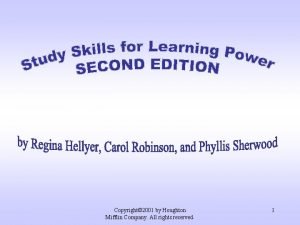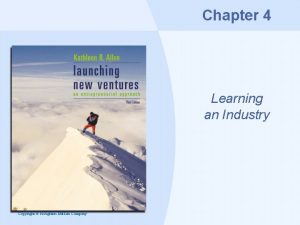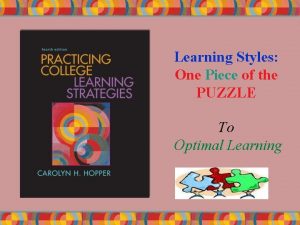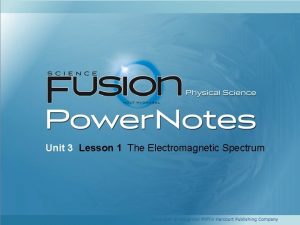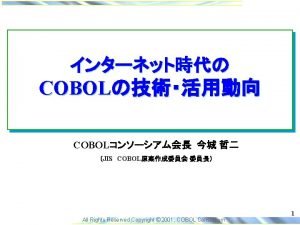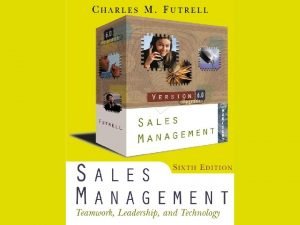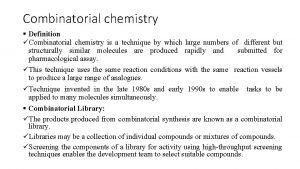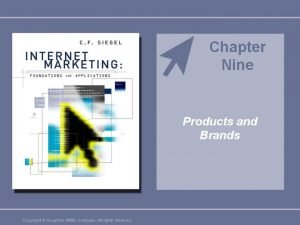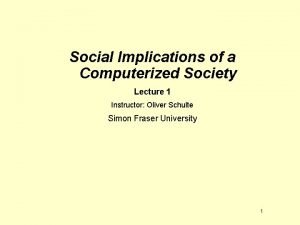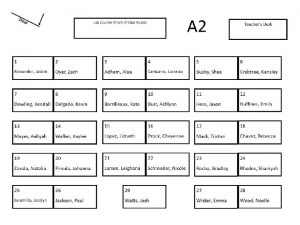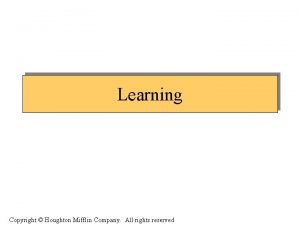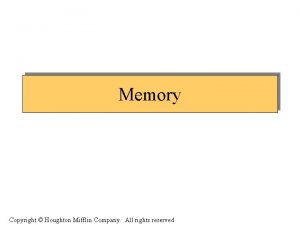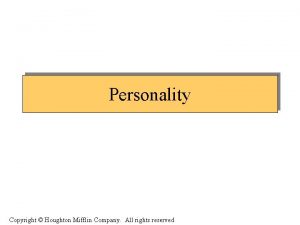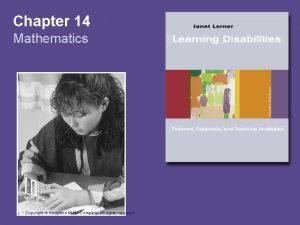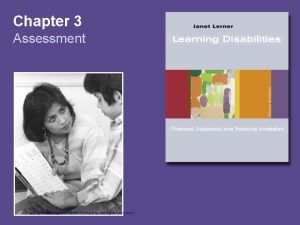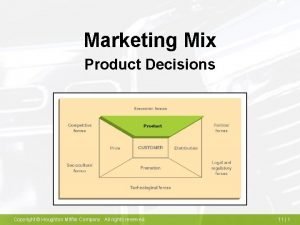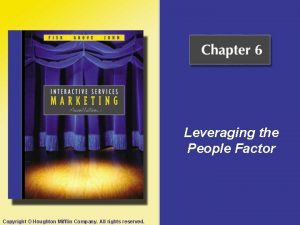Copyright 2001 by Houghton Mifflin Company All rights

Copyright© 2001 by Houghton Mifflin Company. All rights reserved. 1

Chapter 1 The Power of Self-Knowledge Copyright© 2001 by Houghton Mifflin Company. All rights reserved. 2

1. Visual Learners 2. Auditory Learners 3. Tactile Learners Copyright© 2001 by Houghton Mifflin Company. All rights reserved. 3

Extraverts or Introverts Sensors or i. Ntuitives Thinkers or Feelers Judgers or Perceivers Copyright© 2001 by Houghton Mifflin Company. All rights reserved. 4

Locus of Control = where you place responsibility for control over your life • • -External +Internal Other people or things seem to control me Others must push me My outlook on life is often negative. Professor Smith gave me a D! I don’t like change. I have my own way of doing things. I’m unlucky. I never get any breaks! • • • I’m responsible for myself I make my own choices My outlook on life is usually positive I worked hard for this C! Changing wasn’t easy, but now I’m glad I did. • It’s not my fault! I couldn’t help it. I give up! I can’t do anything about it. • • Sure, I’ve had some bad breaks, but they’re not an excuse to quit. I take full responsibility for what happened. I mad a mistake. Now I’ll figure out how to correct it. Copyright© 2001 by Houghton Mifflin Company. All rights reserved. 5

Chapter 2 The Power of Managing Goals, Problems and Stress Copyright© 2001 by Houghton Mifflin Company. All rights reserved. 6

THREE COMPONENTS OF A MEANINGFUL GOAL OWNERSHIP FLEXIBILITY GOAL REALISM Copyright© 2001 by Houghton Mifflin Company. All rights reserved. 7

The Five-Step Way to SOLVE Problems S 0 L V E = = = Search out the real problem Open your mind to all options Line up your plan of action Venture upon your plan Evaluate the results Copyright© 2001 by Houghton Mifflin Company. All rights reserved. 8

Chapter 3 The Power of Note Taking Copyright© 2001 by Houghton Mifflin Company. All rights reserved. 9

The Diagram G et ready w R ite E dit A sk Questions T est yourself Copyright© 2001 by Houghton Mifflin Company. All rights reserved. 10

Ebbinghaus Forgetting Curve Copyright© 2001 by Houghton Mifflin Company. All rights reserved. 11

Quality CREATIVE (problem solving) Questions Pyramid LITERAL What if. . . Why, how, explain, discuss, compare/contrast, describe, CRITICAL THINKING give causes/results Who, what, when, where, how much, list, name, define Do/does, can/could, will/would, is/are, was/were LOWEST (not useful_ Copyright© 2001 by Houghton Mifflin Company. All rights reserved. 12

Chapter 4 The Power of Reading for Meaning Copyright© 2001 by Houghton Mifflin Company. All rights reserved. 13

A) A) Main. Idea B) Implied Main C) Major and Minor Supporting Details D) Transitions Copyright© 2001 by Houghton Mifflin Company. All rights reserved. 14

Copyright© 2001 by Houghton Mifflin Company. All rights reserved. 15

Chapter 5 The Power of Study Reading Copyright© 2001 by Houghton Mifflin Company. All rights reserved. 16

preview READ & MARK Copyright© 2001 by Houghton Mifflin Company. All rights reserved. review by reciting 17

Chapter 6 The Power of Critical Thinking Copyright© 2001 by Houghton Mifflin Company. All rights reserved. 18

A) HASTY GENERALIZATIONS B) STEREOTYPING C) EITHER/OR D) PERSONAL ATTACK E) RED HERRING F) FALSE COMPARISON G) FALSE CAUSE Copyright© 2001 by Houghton Mifflin Company. All rights reserved. 19

? ? ? Questions to Ask with Evaluating Sources of Information ? 1. What is the authority of this author? ? ? ? ? ? ? 2. What is the quality of the writing? 3. Is the publishing body reputable ? 4. How biased is the information? 5. How current is the information? ? ? Copyright© 2001 by Houghton Mifflin Company. All rights reserved. ? ? 20

Chapter 7 The Power of Time Management Copyright© 2001 by Houghton Mifflin Company. All rights reserved. 21

Time Planner A Weekly Study Schedule A Weekly To-Do List Mon. Tues. Wed. Thurs. Fri. Copyright© 2001 by Houghton Mifflin Company. All rights reserved. 22

L =lack of motivation A=afraid of failure S=start-up problems T=task is too overwhelming Copyright© 2001 by Houghton Mifflin Company. All rights reserved. 23

Chapter 8 The Power of Memory Copyright© 2001 by Houghton Mifflin Company. All rights reserved. 24

The Process of INPUT (taking in information OUTPUT STORAGE (retrieving the memory) (keeping the memory) Copyright© 2001 by Houghton Mifflin Company. All rights reserved. 25

Observation Observatio Physical Techniques Association Clustering MEMORY TECHNIQUES Rhymes and Songs Imaging Mnemonics Copyright© 2001 by Houghton Mifflin Company. All rights reserved. 26

The Five Major Visual Organizers 3. T’s 1. Topic Grids 2. Action/Reaction Arrows 5. Timelines 4. Webs Copyright© 2001 by Houghton Mifflin Company. All rights reserved. 27

Chapter 10 The Power of Taking Tests Copyright© 2001 by Houghton Mifflin Company. All rights reserved. 28

Tests Objective True-False Matching Multiple Choice Essay Multi. Paragraph Single Paragraph Copyright© 2001 by Houghton Mifflin Company. All rights reserved. Short Answer Completion Definition 29

• • • • Avoid doom-and gloom talk about the test with fellow students Find out as much about the test as you can to lessen your surprise Arrive a few minutes early so that you won’t feel rushed and so that you will hear any directions the instructor gives RELAX- take deep breaths before you start the test Use positive self-talk. Focus on the test itself, not on your feelings of stress. After you receive the test, jot down slippery facts so you won’t forget them Read all the directions carefully before you begin the test. Make a time plan, budgeting time for each section in accordance with how many points the section is worth. Answer easy questions first. Ignore students who leave early. Realize that comparing yourself negatively with others can undermine your self-confidence If your test anxiety is not relieved by these suggestions, you may need to visit your counseling center Copyright© 2001 by Houghton Mifflin Company. All rights reserved. 30
- Slides: 30



